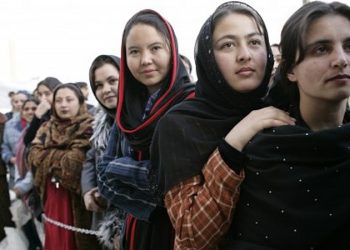Human Lives Human Rights: The Taliban is the ultra-conservative political and religious faction that emerged in the mid-1990s after the withdrawal of Soviet forces and the collapse of Afghanistan’s communist regime, following the collapse of civil order in Afghanistan.
It began as a small force of Afghan students and religious scholars seeking to combat crime and corruption. The faction owes its name, Taliban (Pashto: Ṭālebān, “Students”), to this initial membership.
Origin and first regime
The Taliban emerged after the Afghan War (1978-1992). The new Afghan government failed to establish civil order outside Kabul, and much of the country was exposed to extortion and repeated attacks by local militias and warlords. Facing mass displacement during the war, many Afghans found solidarity in the religious rhetoric of the mujahideen resistance and opportunity in schools of Islamic sciences (called madrasahs) in southern Afghanistan and northern Pakistan. In 1994 a group of former fighters, associated with a madrasah in a village of Kandahar province, successfully subdued a local warlord and began pacifying nearby areas. The faction, which enjoyed popular support with its promise of security and its religious fervor, quickly grew into the movement now known as the Taliban. By late 1996 the Taliban had seized the capital, Kabul, and gained effective control over some two-thirds of the country.
The Taliban faced significant resistance, especially after it asserted its own interpretation of law and order. It combined a strict religious ideology—a mixture of Deobandi traditionalism and Wahhabi puritanism—with a conservative Pashtun social code (Pashtunwali) to create a brutally repressive regime. Its policies included the near-total exclusion of women from public life (including employment and education), the systematic destruction of non-Islamic artistic relics (as occurred in the town of Bamiyan), and the implementation of harsh criminal punishments. Resistance was particularly pronounced among non-Pashtun ethnic groups—namely, the Tajik, the Uzbek, and the Hazara—in the north, west, and central parts of the country, who saw the power of the predominantly Pashtun Taliban as a continuation of the traditional Pashtun hegemony of the country. By 2001 the Taliban controlled all but a small section of northern Afghanistan, and only Saudi Arabia, Pakistan, and the United Arab Emirates ever recognized the regime.
The Afghanistan War and removal from power
Apart from the Taliban’s alarming disregard for human rights, many countries were concerned about the Taliban allowing refuge to Osama bin Laden, who had had helped organize a network of foreign Muslim fighters during the Afghan War. That network, al-Qaeda, had evolved into a network of Islamist militants who sought a violent struggle to free the Islamic world from non-Muslim influence and had orchestrated several attacks against the United States. Even after bin Laden and al-Qaeda were found responsible for the attacks on the World Trade Center in New York City and on the Pentagon outside Washington, D.C., that had occurred on September 11, 2001, the Taliban refused to extradite bin Laden. The United States and its allies began bombarding Afghanistan in October and supported the efforts of the Northern Alliance, a group of anti-Taliban factions in Afghanistan that had been resisting the Taliban’s takeover of the country. In early December the Northern Coalition succeeded in overthrowing the Taliban regime.
Although driven from power and fractured, the Taliban survived, and many of its core members remained at large throughout the Afghanistan War (2001–14). In 2005 the Taliban began enjoying a resurgence, showing indications of greater coordination and resilience among its fighters. Its founder and leader, Mullah Mohammad Omar, remained in hiding with infrequent contact, but senior commanders such as Mullah Dadullah and Mullah Abdul Ghani Baradar were increasingly centralizing the group’s command structure. It adopted new tactics modeled on those being used by insurgents in the Iraq War, including the use of suicide bombings and improvised explosive devices. Recruitment was prolific, drawing on thousands of Afghans disenchanted by widespread corruption in the new Afghan government and resentment toward the casualties and destruction that accompanied the ongoing U.S. and NATO military operations. In 2009, as fighting grew to unprecedented levels, newly elected U.S. Pres. Barack Obama ordered a surge in the U.S. troop presence in the war.
Withdrawal of U.S. troops from Afghanistan and the Taliban’s return to power
A contract was signed with the United States in late February 2020. In exchange for the complete withdrawal of US troops over a 14-month period, the Taliban agreed to end their attacks on US forces and prevent al-Qaeda, the Islamic State in Iraq and their affiliates from operating in Afghanistan. The deal also included an agreement to begin talks with the central government within 10 days, but negotiations were delayed until September because of the central government’s reluctance to carry out a prisoner swap promised to the Taliban by the United States. Little progress was made during the negotiations, which lasted into 2021. Nevertheless, in April the United States reiterated its commitment to complete its withdrawal, although the deadline for withdrawal was delayed from May to September.
As its confrontations with U.S. forces came to an end and the completion of the U.S. withdrawal drew near, an emboldened Taliban rapidly took control of dozens of districts in May–June and closed in on several provincial capitals. The group appeared to lack the manpower and firepower to hold its gains against the larger and better-equipped armed forces of the central government, but the latter’s lack of coordination and lack of responsiveness to the insurgency allowed the Taliban to overrun the country within months. By mid-August the central government had collapsed and the Taliban had captured nearly all of the country, including Kabul.
Given that the Taliban appear to be eager for domestic and international legitimacy, many observers hoped to see a more cohesive and conciliatory regime than the one previously ruled by the Taliban. Early signs, however, showed little determination to change: in September, it filled its transitional government with hard-liners, reopened secondary schools only for boys, and reinstituted the brutal criminal punishments for which it had been known.


















